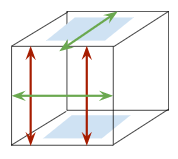Geo/Trig - Quiz 11/30/22
Types of Lines & Planes
Parallel Lines: 2 lines on the same plane that never intersect
They are written as: ↔️AB || ↔️CD
Parallel Planes: 2 planes that never intersect
They are written as: plane a || plane b
Skew Lines: 2 lines on different planes that never intersect

Angles Formed by a Transversal
Corresponding Angles: Same side, same position
Example: Angles 1 and 3
Alternate Interior Angles: Different sides, on the inside
Example: Angles 2 and 6
Alternate Exterior Angles: Different sides, on the outside
Example: Angles 1 and 5
Consecutive Interior Angles: Same side, on the inside
Example: Angles 7 and 6
Consecutive Exterior Angles: Same side, on the outside
Example: Angles 1 and 4

Classifying Slopes
Positive Slope: ↗️
Negative Slope: ↘️
Zero: ↔️
Undefined: ↕️ \n
Slope Formulas
Using a Graph: rise/run = m
Using ordered pairs: y2-y1/x2-x1 = m
Transitive Property (TP)
If two lines are parallel to the same line, they are parallel to each other
If p||q and q||r, then p||r
Converses of Angle Theorems
Corresponding Angles Theorem: If two parallel lines are cut by a transversal, then the pairs of corresponding angles are congruent
Converse: If two lines are cut by a transversal so the corresponding angles are congruent, then the lines are parallel
Alternate Interior Angles Theorem: If a transversal cuts two parallel lines, then the pairs of alternate interior angles are congruent
Converse: If two lines are cut by a transversal so the alternate interior angles are congruent, then the lines are parallel
Alternate Exterior Theorem: If two parallel lines are cut by a transversal, then the pairs of alternate exterior angles are congruent
Converse: If two lines are cut by a transversal so the alternate exterior angles are congruent, then the lines are parallel
Consecutive Interior Angles Theorem: If two parallel lines are cut by a transversal, then the pairs of consecutive interior angles are supplementary
Converse: If two lines are cut by a transversal so the consecutive interior angles are supplementary, then the lines are parallel
Consecutive Exterior Angles Theorem: If two parallel lines are cut by a transversal, then the pairs of consecutive exterior angles are supplementary
Converse: If two lines are cut by a transversal so the consecutive exterior angles are supplementary, then the lines are parallel